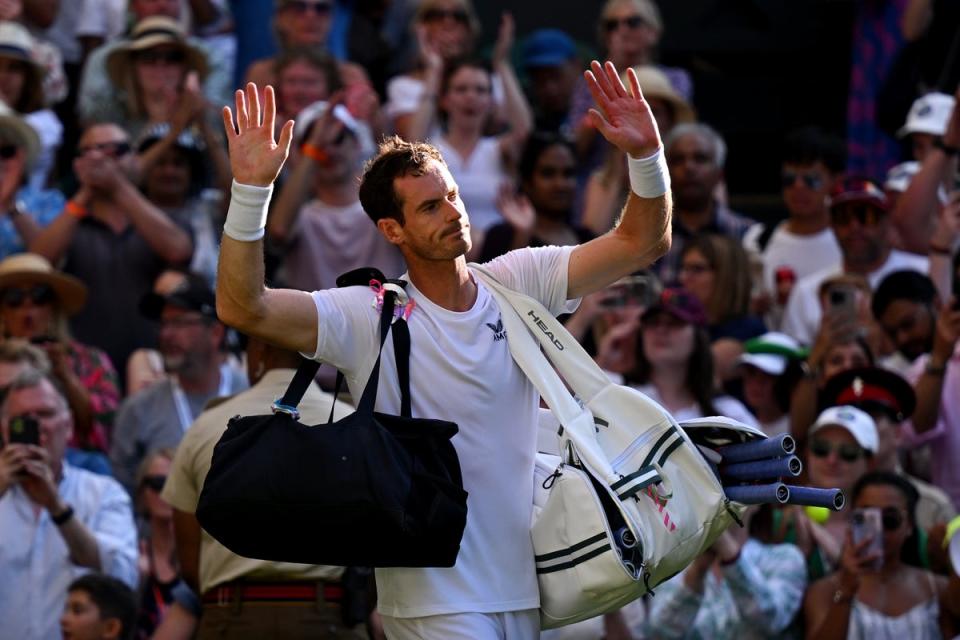Andy Murray and the five Wimbledon moments that defined a golden era
“Wimbledon is Andy Murray and Andy Murray is Wimbledon.”
For the past 20 years, or pretty much all of Emma Raducanu’s life, that statement from the former US Open champion has been true for the British fans at SW19; for 20 years, Murray has taken Wimbledon on a journey that has brought crushing lows and historic, unforgettable highs, culminating now with his final appearance at the Championships.
A determination to persevere in the face of the fiercest pressure and heaviest expectation and end Britain’s 77-year wait for a male Wimbledon winner is the golden legacy Murray leaves behind. But so much more has gone into the making of the legend whose career will be recognised as one of the finest in British sporting history.
As the two-time Wimbledon champion’s career now draws to a close with appearances in the men’s doubles with brother Jamie and in the mixed event with Raducanu, Murray’s magic was in the moments he produced along the way that spoke to his resilience, heart and skill. Above all, was how Murray made us feel along the way.
30 June 2008 vs Richard Gasquet 5-7 3-6 7-6 (7-3) 6-2 6-4
Wimbledon and British tennis knew it had something special when Murray rolled up his sleeve, flexed his muscles and snarled in celebration of the first of those late-night thrillers in the darkness of Centre Court. Down two sets to the Frenchman Richard Gasquet, Murray produced a stunning recovery, answering doubts over his powers of longevity and, more importantly, giving the Wimbledon crowd that first enthralling taste of coming out on top after buckling in for the ride.
This, in many ways, was a breakthrough moment for Murray, a turning point. If his early years at Wimbledon had the feel of punk-rock, this was the victory that catapulted the 21-year-old into the mainstream, with the Centre Court crowd chanting his name as he pulled off the escape. Murray, strangely, had been characterised in a way that made him a little divisive in those early years, which appeared to stem from a joke about supporting anyone but England at the 2006 World Cup.
Though a lot of the coldness towards Murray also seemed to come from snobbery and a general sense that he was not part of the Wimbledon establishment, that a snarling, grumbling Scot did not fit in here. In a parallel universe, after falling two sets down to Gasquet Murray crashes out and the uneasy relationship continues. Instead, he doubled down on who he was and produced a comeback of heart and character that would define so many of his outings on Centre Court. And Wimbledon loved him for it.

8 July 2012 vs Roger Federer 4–6, 7–5, 6–3, 6–4
The post-match speech that changed everything. Murray was getting closer and closer to his first grand slam title but the final step proved the hardest of all. He arrived at Wimbledon in 2012 having reached the semi-finals three years in a row at the All England Club, losing to Andy Roddick and twice to Rafael Nadal.
With each heartbreak came the sense that Murray was accumulating the burden of painful defeats at the grand slams, having also lost two Australian Open finals to Roger Federer and, in 2011, to Novak Djokovic. But reaching his first Wimbledon final in 2012 offered the chance to change that, as he faced Federer in the biggest match of his life on Centre Court.
This was the defeat that truly showed the suffocating pressure and weight of expectation Murray was under. At the age of 25 and as the first British man to reach the final since 1938, Murray took the first set against the great Federer but the Swiss overturned the Scot’s momentum after the rain delay to win his seventh Wimbledon title.
The key part, though, came after: as the beaten finalist prepared to address the crowd in his runners-up speech, the previously guarded Murray was unable to hide his emotions. Already welling up before taking the microphone from Sue Barker, Murray’s voice cracked. His opening line - "I’m going to try this and it’s not going to be easy" - brought a wave of tears around Centre Court.
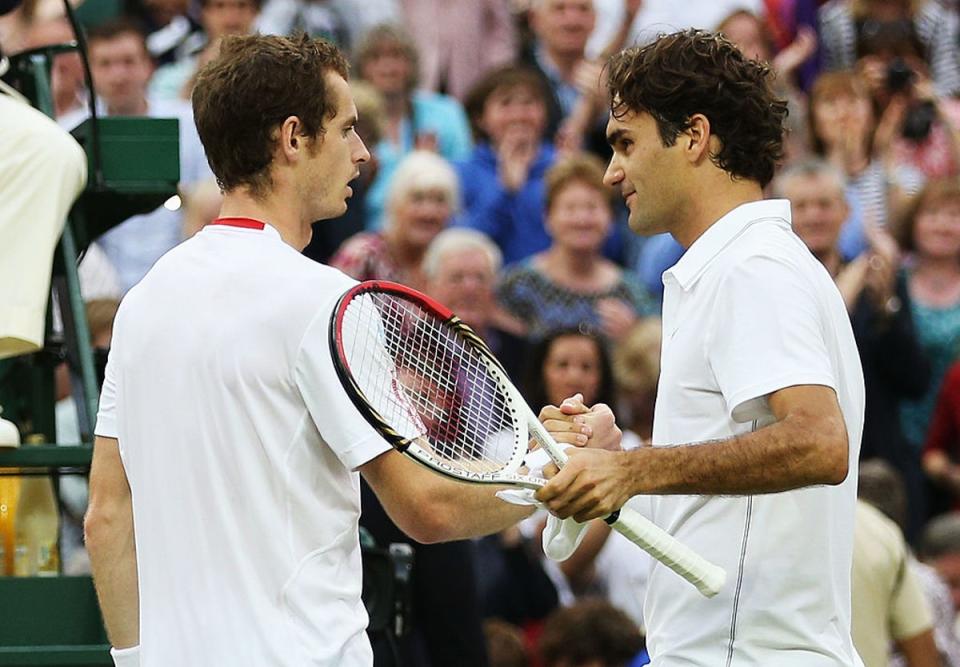
"Everybody always talks about the pressure of playing at Wimbledon, but it’s not the people watching - they make it incredible," he said.
The release marked a significant shift in Murray’s approach and his relationship with the British public that, outside of his loyal supporters, had occasionally been a little cold until that point. A raw Murray was seen in a different light and it allowed him to return to Wimbledon three weeks later for the Olympics singles with a renewed sense of purpose.
Wearing the Team GB uniform in a rematch against Federer, Murray was roared on by Centre Court in one of the best performances of his career, turning agony into celebration as he won the gold medal. With a renewed belief that he could compete with the ‘Big Three’, Murray sensationally claimed his first grand slam title in a five-set victory over Djokovic in the US Open final later than year.
7 July 2013 vs Novak Djokovic 6–4, 7–5, 6–4
That game, that stomach-turning, excruciating final game, where past heartbreak threatened to repeat itself and then, finally, those immortal words, “the waiting is over”.
The golden, defining victory of Andy Murray’s career came in an unforgettable Wimbledon final in 2013, became the first British man to win the Championships in 77 years, but while the records will show a straight-sets win the reality was a tortuous marathon that gave way to the sweetest relief.
One of the greatest intricacies of tennis is the finish line and getting yourself across it; there is no clock to run down, no fixed point to reach in the sense that standing a point away from victory can turn into being an hour away from victory in an instant.
As Murray served for the Wimbledon title the enormity of the moment weighed over everyone, from two sets up, 5-4 up, 40-0 up Murray had three Championship points on serve but as Djokovic battled back to deuce the final felt on the edge once again. Had Murray been broken, Djokovic would have had the momentum.
Murray says he cannot remember the final moments of the greatest day of his career. For two sets, he had dominated Djokovic, but all anyone watching remember is the stress of those final points.
This, though, was the perfect encapsulation of the Murray experience and the rollercoaster of following him; an ability to put the British public on his back and carry them through the ups and downs, to test the emotions. And after all the pain there could not have been a more deserving champion of the Wimbledon title.
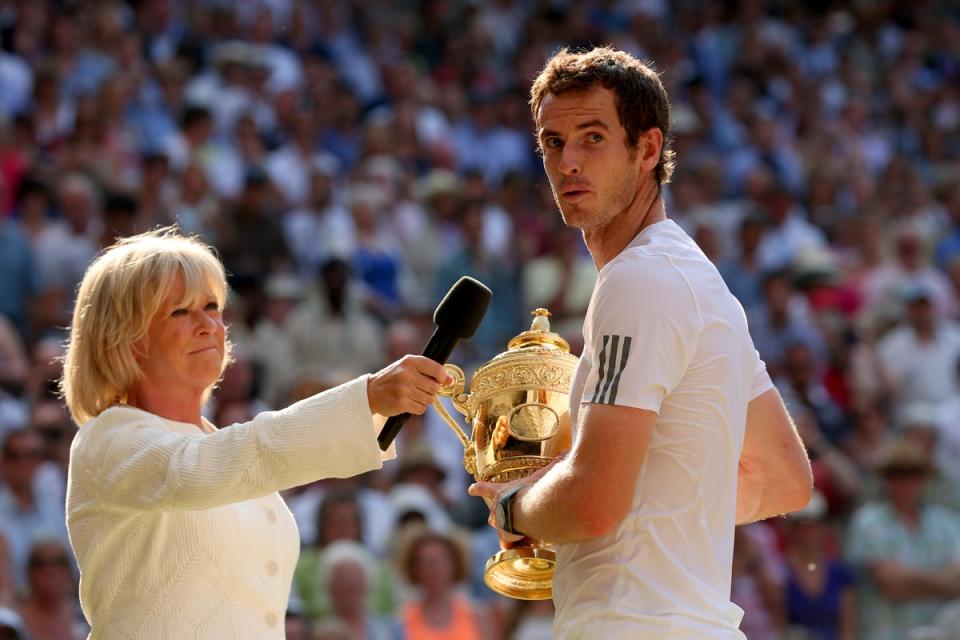
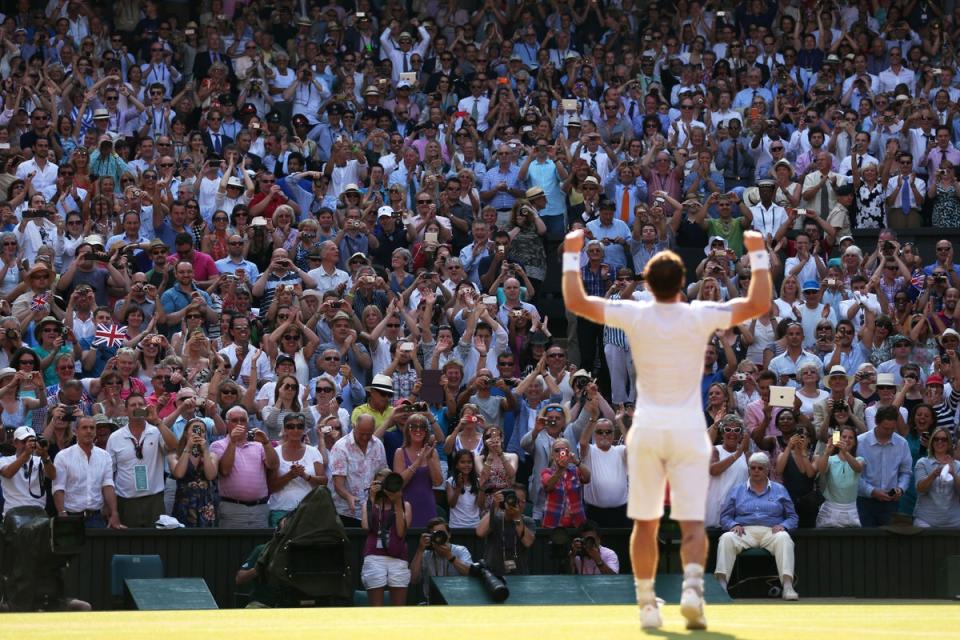
10 July 2016 vs Milos Raonic 6-4 7-6 (7-3) 7-6 (7-2)
Murray’s 2016 season was arguably the finest of his career and his second Wimbledon title came without the pressure and expectation of ending Britain’s long wait for a home winner. There was a confidence and assurance around Murray as he calmly worked himself through the draw. Milos Raonic, the big-serving Canadian, had shocked Roger Federer in the semi-finals but was then swept aside by Murray in the final. As Murray hugged the Wimbledon trophy, this was a player at home with himself and who he was.
The following months were Murray in his element, starting with the 2016 Rio Olympics where he was nominated as Britain’s flag-bearer before winning his second gold medal against Juan Martin del Potro in the singles final. From there, a string of titles culminated in victory over Novak Djokovic at the ATP Tour Finals to finish the season at World No 1. Murray reaching the summit of the men’s rankings was in itself a story of resilience and determination. It took him 3,493 days after first entering the top-10 to reach World No 1.
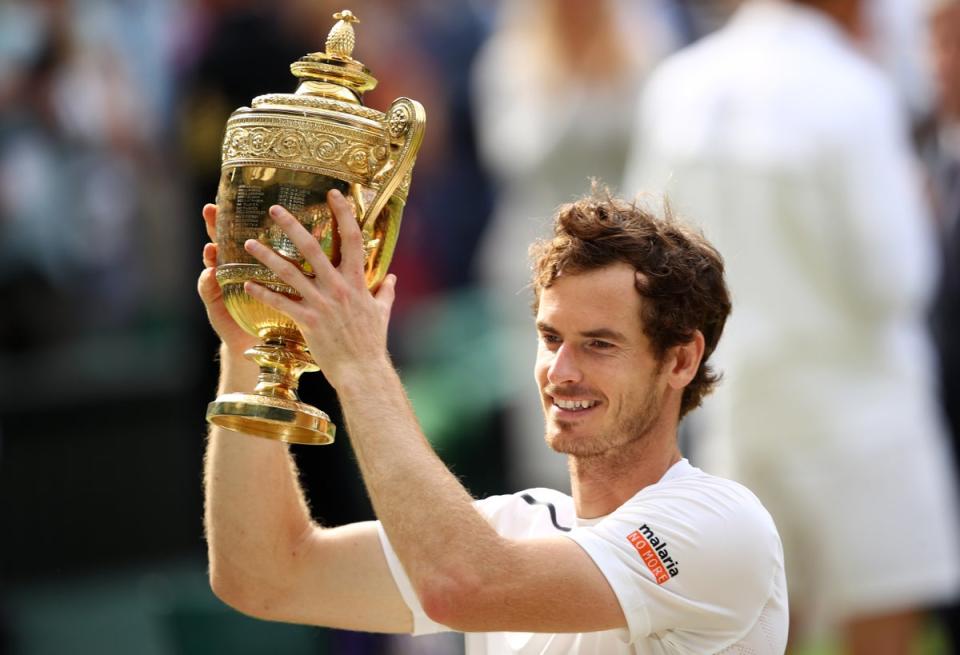
And then, before you knew it, it was over already, his days at the top fading before we realised. His 2017 Wimbledon defeat to Sam Querrey was the fateful day where Murray hobbled off Centre Court with the hip injury that would dramatically alter the direction of his career. It would be his final Wimbledon singles appearance for four years as he missed the majority of the 2018 season and took the drastic decision at the start of 2019 to undergo career-saving surgery.
7 July 2023 vs Stefanos Tsitsipas 7-6 (7-3) 6-7 (2-7) 4-6 7-6 (7-3) 6-4
Murray had already seen the end, been forced to watch his own retirement video as tributes were written. Murray said in a teary press conference before the Australian Open in 2019 that he could not keep playing through pain but would try to battle on until Wimbledon. But a five-set defeat to Roberto Bautista Agut in Melbourne was not the end, rather, it was the start of a new chapter with his metal hip.
Limited physically in the final years of his career, Murray’s leant on his spirit and character, as his refusal to quit earned him new admirers respective of his previous achievements. His love of the game and determination to come back and compete led to a series of late-night epics under the Centre Court roof, and this time, no one was taking them for granted.
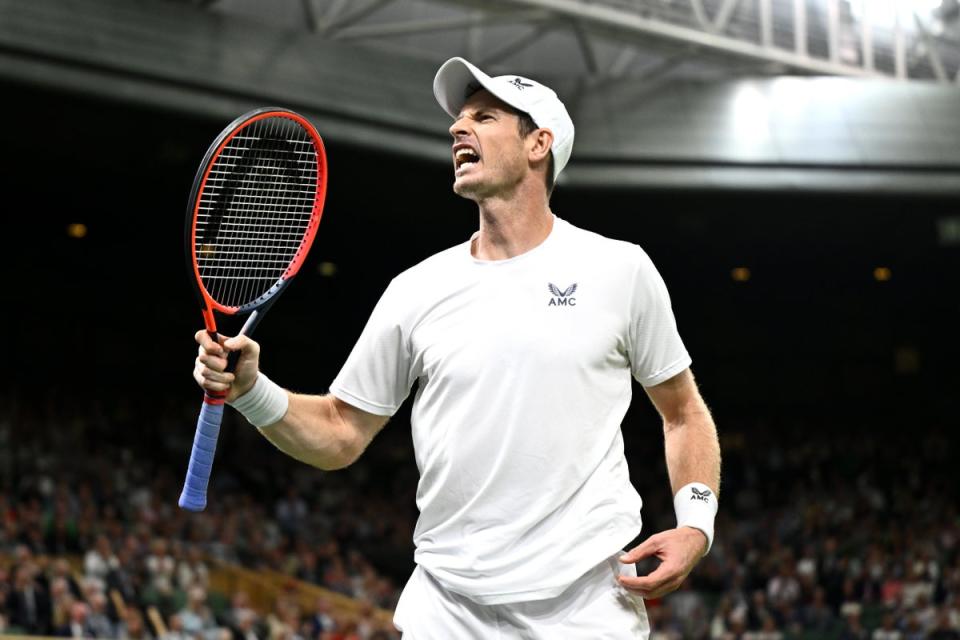
And somehow, Murray defied what should have been possible in those later years, the trademark win of his post-surgery career being an epic five-set comeback against Thanasi Kokkinakis at the Australian Open. It stretched the boundaries of belief, as Murray battled from two sets down in the early hours of the Melbourne morning, winning the longest and latest match of his career, at the scene of where he had watched his own retirement video four years before.
At Wimbledon, Murray returned five months later with hopes of a similar performance, raging against the dying of the light. He almost had it against Stefanos Tsitsipas, a grand slam finalist and top-10 opponent, as he took on the Greek stride for stride on Centre Court and led two sets to one before the evening curfew.
When they returned, Tsitsipas edged a tight five-set battle that could have gone either way. A back injury before the 2024 tournament leaves this as Murray’s final singles match at Wimbledon. But denied a final farewell in the singles, he had already given us so much more.
